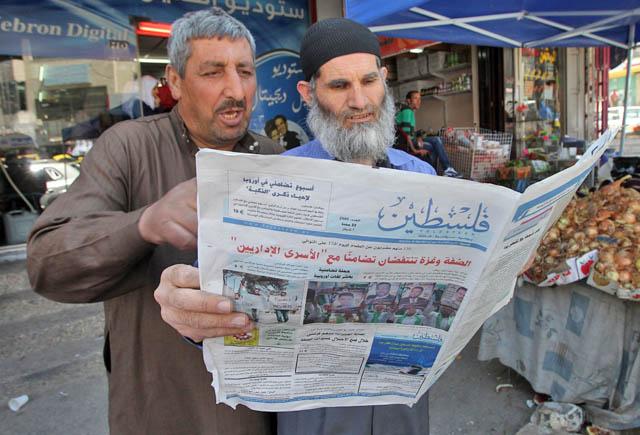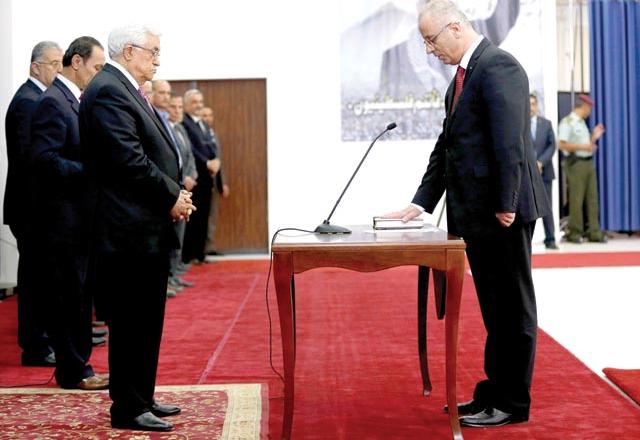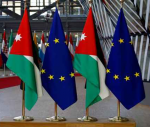You are here
Palestinian reconciliation pact threatened by disunity
By Reuters - Jun 10,2014 - Last updated at Jun 10,2014

GAZA — A leader from the Palestinian Islamist group Hamas accused President Mahmoud Abbas’ Fateh Party on Tuesday of jeopardising a reconciliation deal, just a week after a unity government was formed to end their feuding.
Problems between the two sides surfaced just days after the new administration took office, when it failed to pay some 40,000 civil servants hired by Hamas in Gaza, saying the employees had to be vetted before receiving their salary.
Angry police loyal to Hamas in the Gaza Strip ordered the closure of all banks in the coastal enclave until the issue was resolved, dealing a fresh blow to an already sickly economy.
The tensions shifted to the nearby West Bank on Monday, when Hamas said that security forces loyal to Abbas had used violence to break up a rally organised by the movement and had assaulted senior Islamist leader Hassan Youssef.
“Since the reconciliation pact was signed, the gap between us and Fateh and the security services has got bigger,” Youssef told reporters in the West Bank city of Ramallah on Tuesday.
“This is not a unity. They are doing this to push us to say we do not want reconciliation. We want reconciliation,” the Hamas official said, accusing Abbas’ policemen of confiscating the Islamists’ green flags and detaining the group’s supporters.
A security source in the West Bank said police intervened after protesters began chanting slogans against Abbas’ Palestinian Authority, the body that exercises partial rule over the Palestinian territories.
Youssef denied that and called on the Palestinian Authority to say “whether Hamas was a banned group in the West Bank”.
In a sign of the mutual animosity that exists between the two groups, Fatah accused Hamas activists of attacking their supporters in the West Bank city of Hebron on Monday, leaving four people needing hospital care.
Pay constraints
Israeli authorities have urged foreign allies to shun the unity government because it enjoys the backing of Hamas, which refuses to recognise Israel’s right to exist.
But Western governments, including the United States, have pledged to work with Abbas’ new administration.
Ordinary Palestinians had hoped that after years of failed attempts to end the stand-off between the two factions, the creation of a government of technocrats would pave the way to genuine reconciliation and long-delayed elections.
However, tensions in Gaza, creaking under a rigid blockade imposed by both the Israelis and Egyptians, have only worsened, with Hamas employees furious that while they had not been paid, staff tied to the Palestinian Authority had received a salary.
Hamas itself had struggled to pay its staff in recent months due partly to the continued blockade — one of the reasons why the group decided to sign last week’s accord with Abbas and dissolve its own government in Gaza.
After Hamas seized control of Gaza in 2007, the Palestinian Authority continued to pay its old 70,000-strong workforce in the enclave, even though the majority of them no longer worked.
Some of them are now meant to return to their old duties, but it was not clear how they would be reintegrated, or how long it would take to vet all the civil servants hired by Hamas.
Looking to apply pressure on the new unity government, Hamas police have ordered the closure of all of Gaza’s banks, creating a fresh headache for local businesses.
Merchants importing goods from Israel or abroad were seeking new ways to pay their counterparts.
“It is catastrophic if we cannot pay for food and fuel. Israeli merchants won’t send goods here for free. It will cause a disaster here,” said Sami Abu Ahmed, a Gaza business man.
Ehab Bessaiso, a spokesman for the unity government, said the administration was looking to resolve the problems and urged both sides to avoid causing further tensions that “harm our interests and hinders the government from doing its duties”.
Related Articles
Palestinian President Mahmoud Abbas on Thursday asked Prime Minister Rami Hamdallah to head a new national unity government which will bring together the feuding Hamas and Fateh parties.
A pro-Islamist newspaper was sold in the West Bank on Saturday for the first time in seven years, another sign of a Palestinian unity pact that prompted Israel to suspend peace talks with Palestinian President Mahmoud Abbas.
President Mahmoud Abbas swore in a Palestinian unity government on Monday in a reconciliation deal with Hamas Islamists that led Israel to freeze US-brokered peace talks.


















